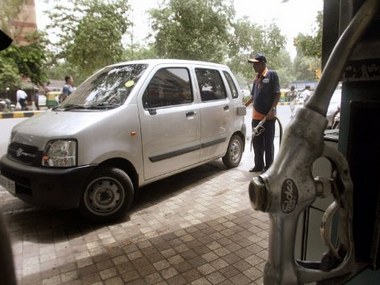Petrol prices are likely to be hiked on 15 December because of the continuing fall in the value of the rupee against the greenback, a top official of BPCL told The Economic Times.
“We will have to take a call on petrol prices, especially as internationally too, prices of petrol have risen by a few dollars in the past fortnight, so that combined with the consistently falling rupee, it will have to reflect in the price revision on 15 December,” S Varadarajan, director of finance, BPCL, told The Economic Times.
[caption id=“attachment_156089” align=“alignleft” width=“380” caption=“Petrol prices were deregulated in July last year. AFP”]  [/caption]
He said the falling rupee had also adversely affected the oil marketing company’s borrowings. “We have already incurred an interest cost of Rs 800 crore in the first half of this fiscal and are slated to spend another Rs 800 crore to service our interest burden in the second half of the fiscal, which is extremely high compared to our interest cost of last year - Rs 1,100 crore.”
He also said that in the 12 months to March 2012, the industry’s total under-recoveries (losses because of selling petroleum products at subsidised prices) would add up to Rs 1,40,000 crore.
The rupee has plunged by 16 percent since the start of this year. Currently, the partially convertible unit is trading at 53.74 to the US dollar.
In the past months or so, oil marketing companies had reduced the price of petrol to reflect moderating international prices.
Petrol prices were deregulated in July last year, and there is a wide gap between petrol and diesel prices (which are still controlled by the government).
Along with diesel, kerosene and domestic LPG prices are also regulated by the government.
Oil accounts for one-third of India imports. When the rupee falls, the import bill rises in local currency, which further bloats the country’s trade account deficit (the gap between exports and imports) as well as the government’s oil subsidy bill.


)
)
)
)
)
)
)
)
)



